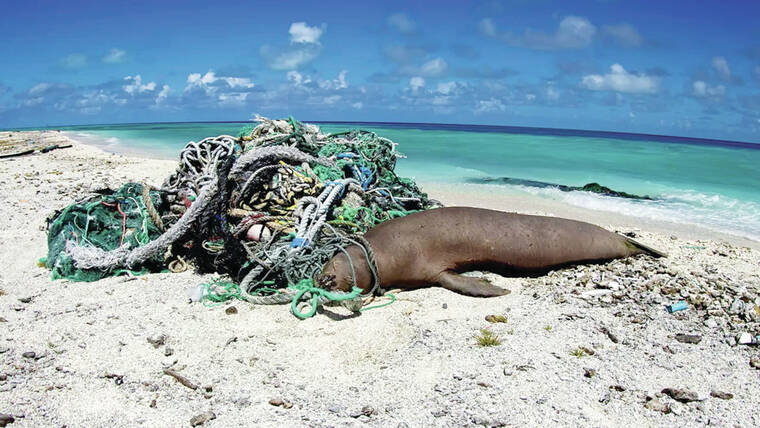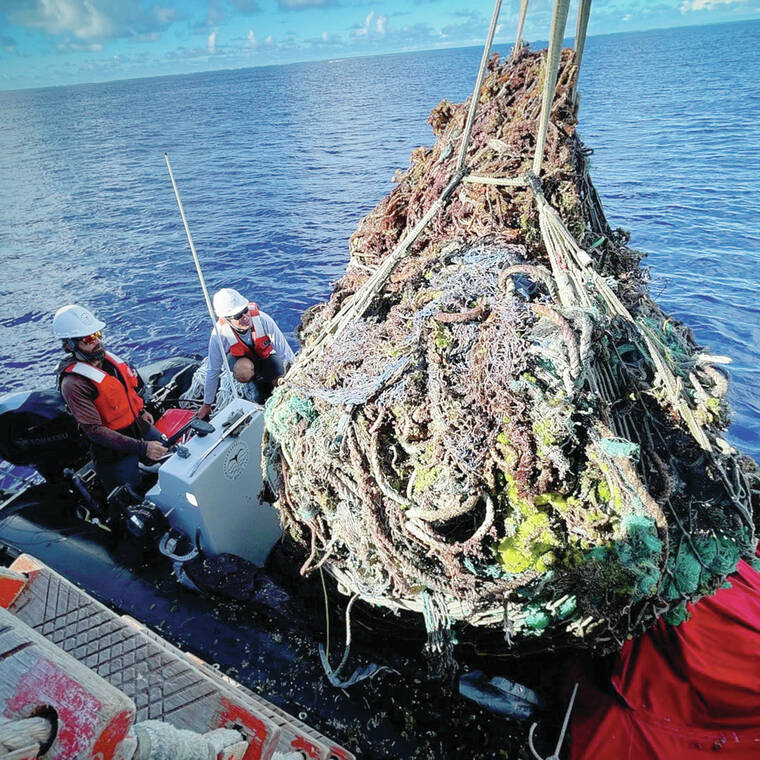LIHUE — The University of Hawai‘i and its partners have been awarded more than $5.1 million in federal grants to address rampant marine debris issues across the Hawaiian Islands.
The investments from the National Sea Grant College Program — part of the National Oceanic and Atmospheric Administration — will go toward three projects primarily focused on abandoned, lost and discarded fishing gear. This type of debris is known to harm threatened and endangered marine species, commercial and recreational fisheries, shipping and boating ventures, and is a health hazard to humans.
“It is an honor to be partnering on these projects with researchers, cultural practitioners, industry members and other experts from all across the state to tackle a problem that has had profound negative impacts on the environment, the economy and the health of our communities,” said Daren Leerner, who is director of Hawai‘i Sea Grant and principal investigator of two of the grants.
One of these projects — focused on to improving fishing gear removal efforts by developing new net detection, cutting and lifting technologies and techniques — will receive over $1.8 million in funding. Currently, marine net masses, known to weigh up to 11 tons, are cut and brought onto boats by hand.
The project will focus on efforts in the Papahanaumokuakea Marine National Monument, an approximately 583,000 square mile sacred Native Hawaiian site and one of the world’s largest protected areas. Since 1996, grant applicant organization Papahanaumokuakea Marine Debris Project (PMDP) has removed 2.4 million pounds of debris from the site.
“Our region is the perfect test bed to develop new tools and processes to push the boundaries of existing marine debris removal approaches,” said Kevin O’Brien, PMDP founder and president, and co-principal investigator of the project.
Additionally, nearly $3 million will go toward the Nets to Roads project, a multi-pronged initiative to reuse marine debris in building Hawai‘i’s infrastructure.
The plan includes improvements to debris detection and float trajectory estimations, as well as rapid removal and transport to a centralized storage facility, where the waste would be sorted and repurposed into plastic pellets for use in the state’s asphalt roads.
“As a major win-win for the environment and the residents of Hawai‘i, the funding will formally bring together some of the most impactful marine debris researchers and removal nonprofit organizations … while also linking their efforts toward an innovative long-term repurposing idea that can make Hawai‘i’s public road infrastructure more sustainable,” said Jennifer Lynch, co-director of Hawai‘i Pacific University’s Center for Marine Debris Research and co-principal investigator of the Nets to Roads project.
Finally, approximately $300,000 is planned to create the Pacific Island Marine Debris Community Action Coalition — a partnership between Hawai‘i and the U.S.-affiliated Pacific Islands — to foster more coordinated efforts to combat the impacts of floating debris.
“Efforts to mitigate this problem have been limited historically, so this project will connect communities who have not been traditionally engaged to address marine debris with nonprofit organizations, government agencies and academic institutions to develop a regional Pacific Islands Marine Debris Action Plan,” said Eileen Nalley, Hawai‘i Sea Grant ocean and coastal ecosystem health specialist and principal investigator of the coalition project.
Mary Donohue, Hawai‘i Sea Grant specialist and co-principal investigator of all three projects, expressed hope that the three projects would amplify each others’ impacts on combating marine debris.
“Critically, the intersection of these three projects and integration of efforts across them will drive innovation at a scale not before possible in Hawai‘i or anywhere in the world,” she said.
“The projects in and of themselves are brilliant, but together they constitute a unique opportunity to significantly advance our ability to mitigate derelict fishing gear.”
•••
Jackson Healy, reporter, can be reached at 808-647-4966 or jhealy@thegardenisland.com.





